|
|
|
Sort Order |
|
|
|
Items / Page
|
|
|
|
|
|
|
| Srl | Item |
| 1 |
ID:
184667
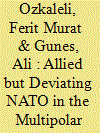

|
|
|
|
|
| Summary/Abstract |
“How long can NATO last in a post-US hegemonic, multipolar world?” has become an important question in contemporary world politics. By statistically analyzing NATO alliance cohesion since its inception, this analysis contributes to the literature by developing an original set of indicators that rely on the ideal point estimates from a recent UN General Assembly voting dataset. It empirically verifies that NATO members have higher cohesion than other UN members, although the United States has been the most significant deviating member since 1980. The findings support some earlier proposals such as the external threat hypothesis. They also contradict some others, notably the literature on the Donald Trump administration’s withdrawal doctrine, and the decline of US hegemony and its policy implications. The article concludes that the future challenge for NATO cohesion not only would be the possibility of US abdication or abandonment, but also other members’ balancing the United States as the hegemon.
|
|
|
|
|
|
|
|
|
|
|
|
|
|
|
|
| 2 |
ID:
163383
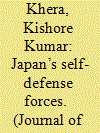

|
|
|
|
|
| Summary/Abstract |
Japan banks heavily on her security alliance with the United States (US) to ensure availability of requisite military capability in the region. China’s economic and military capabilities have grown in the last two decades, closing the gap with the US. With diminishing differential, especially with respect to China, the US’ deterrence power has gradually declined. Under these conditions, Japan has to develop Self-Defense Forces (SDF) capabilities to ensure that it, in combination with its alliance partner, the US, is able to meet national security challenges. In a major shift in security policy, on 9 January 2007 Japan’s Parliament approved the upgradation of Defense Agency/SDF to a full-fledged ministry. However, the changes in the SDF, especially in its doctrine and roles, have been gradual. Till SDF graduates to have an offensive capability that can deter capably, the US will continue to be a key player in Japan’s security milieu.
|
|
|
|
|
|
|
|
|
|
|
|
|
|
|
|
| 3 |
ID:
059140
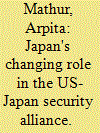

|
|
|
|
|
| Publication |
Oct-Dec 2004.
|
|
|
|
|
|
|
|
|
|
|
|
|
|
|
|
| 4 |
ID:
193009
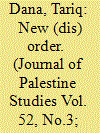

|
|
|
|
|
| Summary/Abstract |
The normalization of relations between the United Arab Emirates (UAE) and Israel under the Abraham Accords is part of a long-standing security cooperation between the two regimes to monopolize regional power. Indeed, with the rapidly changing political and security landscape in the Arab world, the Abraham Accords have become central to understanding alliance formation in the region. The Accords have significantly enhanced the already existing security and military relations between Israel and the UAE, with heavy Emirati investment in advanced Israeli weapons systems and security technologies, military and intelligence sharing, as well as economic partnerships in strategic sectors. While the alliance is often portrayed as a defensive security arrangement aimed at countering the “Iranian threat,” a closer examination reveals that it is much more than that. Sponsored by the United States, the alliance entrenches Israeli settler colonialism and Arab authoritarianism as mutually inclusive pillars for the region, with the ultimate objective of reproducing US hegemony in the face of changing global dynamics.
|
|
|
|
|
|
|
|
|
|
|
|
|
|
|
|
| 5 |
ID:
192169
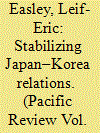

|
|
|
|
|
| Summary/Abstract |
By the time Prime Minister Abe Shinzo and President Park Geun-hye took office, Japan-South Korea relations were already experiencing a downturn over history issues and Lee Myung-bak’s unprecedented presidential visit to the disputed islets of Dokdo/Takeshima. Park’s refusal to hold a bilateral summit became the symbol of strained ties. Then on November 2, 2015 — 980 days after taking office — Park met Abe for bilateral talks in Seoul. On December 28, the two sides declared a rapprochement with an agreement supporting survivors of wartime brothels. Tensions worsened again during President Moon Jae-in’s term (2017–2022), contradicting the narrative that leaders had turned relations around in late 2015. Yet the diplomatic relationship was not on a downward spiral. Japanese and Korean policymakers managed to put a floor under their interactions owing to three stabilizing mechanisms that operated during both the Park and Moon administrations. First, political elites practiced mutual restraint to limit vicious cycles of nationalist recriminations. Second, Tokyo and Seoul carefully calibrated policies toward Beijing while avoiding divergence from each other. Third, reassuring the United States about the cost-effectiveness of its alliances involved trilateral cooperation that also helped stabilize Japan-South Korea relations.
|
|
|
|
|
|
|
|
|
|
|
|
|
|
|
|
|
|
|
|
|